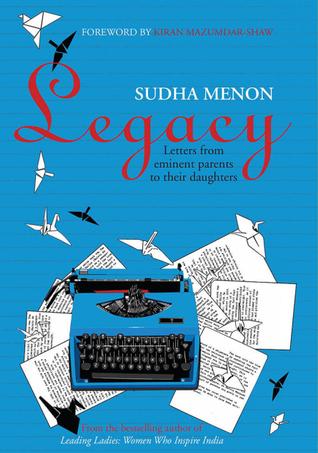Letters, once again, this time some well known or as the author says eminent parents write letters to their daughters. Letters to the daughter were made famous by none another than Jawahar Lal Nehru when his letters to Indira Gandhi came in the form of books. I remember reading them when I was a kid. And the impression is that of a father trying to keep in touch with the daughter while he is in Jail, or when he is away from her. And he mentions small little things to her, things that a father tells his daughter. So, I was keen to hear what the successful parents of my generation tell their daughters. The list of parents writing is luminous. Does the book Legacy, live up to my expectation? – In a very limited way may be.
The book Legacy is organized alphabetically by parent’s name. So when I read Ajay Piramal’s letter first, I found it too preachy and too generic. Only to discover that this is going to repeat for most of the letters. I liked Capt Gopinath’s letter as his words were quite grounded and not much jargon was used. I loved the fact that Jatin Das refused to call it a letter. And at most agreed to call it a Note to his daughter Nandita. And his note was the most personal note that I found in the book. Renuka Ramnath’s journey through her letter was a revelation to me. I loved the fun element in Zia Mody’s letter.
K V Kamath shares some interesting anecdotes from his childhood. And from his days when he was famously grooming the women leaders in India. I agree with him that no affirmative action is the best action, make merit the criteria and the rest will follow. He goes at length explaining that he respects his own daughter’s decision to not pursue an active career that I do not think was required. Narayana Murthy’s account of the changes that birth of his daughter brought in him is something many fathers would connect with.
What is common in all the letters is their language, making it appear that the letters have been written not by the parents themselves but either by the author or some ghostwriter. Most of these people communicate publicly. And if you hear them speak regularly, you know it is not their language. And all of them cannot be equally formal in their conversation with their child. Let me take an example, Narayana Murthy is always referring to his wife as Sudha. And never just my wife. That shows his sheer respect for her as an individual. Here she is referred only as your mother – just like every other father in the book.
The personal touch that you expect a lot in parent-daughter conversation is missing. They could have been generic letters written to anyone in general. The bond or nuances of father-daughter relationship hardly come out. There is a lot of Gyan. And again the same Gyan by each parent and the same cherishing of daughters by each of them. I found it too homogenous.
I found it unbelievable that none of them had any issues whatsoever with either their kids or parents. Each of them is like a Rajshri film’s family where everyone is pure as gold and has only good things to share. All their kids are grounded and down to earth, all of them are responsible and all they have to tell them is to follow their own passion, which most of them are already doing. Having said that, this book did tell me something very reassuring, like all parents these parents also fiercely guard their relationship with their children. They do not share their real relationship with the rest of the world. And definitely not make it available for public consumption.
How can you tell about the close family things in public? Especially to your child with whom you share things in a way that tells them not only about your journey but also about the lessons it taught you. The learning may not always be cliché and positive. After all, did our grandmothers not tell us not to trust people with such and such eyes or something like that?
The level at which this book Legacy by Sudha Menon, worked for me was getting to know a little personal side of these business leaders. About their families and what their daughters are doing, what they studied or are studying. Read it to know the success stories of newspapers as humans with families.
You may buy this book – Legacy: Letters from eminent parents to their daughters by Sudha Menon at Amazon.










Hi Anuradha,
I recently got this book from a second hand book shop and was highly disappointing, exactly the way you sound in the review.
I finished close to 80% but what bothered me extremely was everybody suggesting their kids to follow their passions, be hard working and ” Live up to the expectations of their parents & society” even to the stage of missing out on “me TIME” and sleep. At this day and age, i found it quite repulsive. I am of an opinion that its equally important to keep a healthy balance between our ambitions and our well being ( mostly emotional).
All the letters followed a pattern and sounded like sermons which I could not relate to at all. I gave up in the end and could not finish the book. It clearly wasn’t what i was looking for or would want my kid to read as well when she will be growing up. Your reviews completely resonates with my thought process and I am happy to read it after reading so many fabulous reviews on Goodreads.
Most people tend to write positive reviews only or maybe they have not read enough. The larger than life personalities also tend to put people in awe.